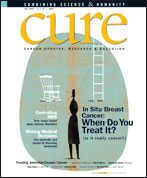Publication
Article
CURE
Job-Searching Hints for Survivors
Author(s):
Reentering the workforce after a cancer diagnosis can add anxiety to an already stressful job hunt and whether a survivor chooses to disclose a diagnosis or not, there are a few helpful guidelines to consider.
Reentering the workforce after a cancer diagnosis can add anxiety to an already stressful job hunt. Most experts advise cancer survivors not to volunteer medical information to a potential employer before a job offer has been extended. On the other hand, some job seekers specifically use their survivorship status as a way to show their personality and perseverance. Regardless of whether you choose to disclose your cancer diagnosis, here are some guidelines to consider:
> Although it is illegal for a potential employer to ask about previous medical history if it does not relate to the job, falsifying information on a résumé, job application or lying during an interview could be grounds for termination and health insurance could be revoked. Even if an illegal human resources question is asked, sidestep the issue with something positive.
> Seek help from a job counselor on how to answer questions related to your diagnosis. As with any interview, practice answering certain questions you may be asked, like employment gaps or why you left your previous position. Restructuring your résumé to highlight experience and skills is better suited than a chronological résumé if there are gaps in employment from treatment or caregiving.
> Drug tests are usually given after a job offer, but ask your doctor if any prescription drugs, including pain medication, will show up on the drug test. It is very rare that a drug test will reveal chemotherapy, but it is best to be proactive and present this information or your prescription to the clinic or hospital that is doing the drug test instead of to a potential employer. Even if a drug test shows a legal substance for a certain condition, the information is considered confidential. If the offer is retracted based on the medical condition, in most instances it may be covered under the Americans with Disabilities Act.
> If side effects will impact your work, such as needing additional sick leave, flex time and health insurance, talk to your employer after the job offer has been extended to find an acceptable solution for both parties.






